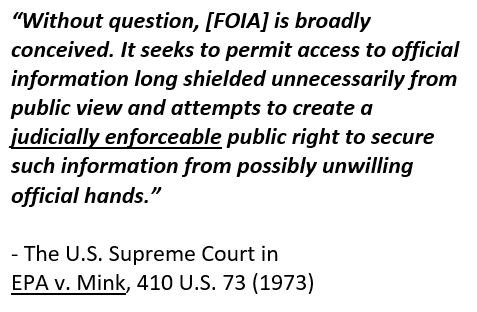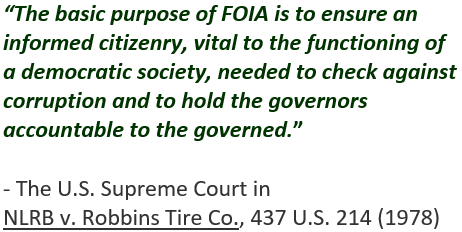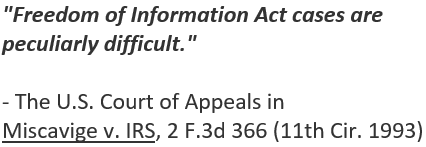Freedom of Information Act (FOIA) Litigation
Challenging FOIA Delays & Denials in Court
Anyone may request information from the government….
and they can sue the government to obtain withheld information.
With decades of federal court experience and working with government lawyers,
Sarraf Gentile LLP is well equipped to litigate FOIA delays & denials on behalf of our clients.
Because the government often pays our fees, our clients usually pay nothing!
 The Freedom of Information Act (FOIA) ensures public access to government documents. But there can be no meaningful access without judicial enforcement. Therefore, anyone with an unsuccessful FOIA request may sue the government and request that a federal court enforce it. In many cases, the court may even award attorneys fees to the requesting party. In other words, if a FOIA suit is successful, the government may be compelled to pay the attorneys fees and case expenses of the party who brought the lawsuit — our clients usually pay nothing!
The Freedom of Information Act (FOIA) ensures public access to government documents. But there can be no meaningful access without judicial enforcement. Therefore, anyone with an unsuccessful FOIA request may sue the government and request that a federal court enforce it. In many cases, the court may even award attorneys fees to the requesting party. In other words, if a FOIA suit is successful, the government may be compelled to pay the attorneys fees and case expenses of the party who brought the lawsuit — our clients usually pay nothing!
FOIA Background

FOIA was enacted in 1966, amended in 1974 and, most recently, strengthened in 2007 to allow prevailing parties to obtain fees and costs. FOIA’s basic purpose is to promote government transparency and accountability. The text of FOIA is relatively short and can be found at 5 U.S.C. § 552. Most states have their own version of FOIA, commonly referred to as Open Records, Open Meetings, Open Government or Sunshine Laws.
FOIA Exemptions
FOIA assumes an open government. Accordingly, government records will normally be accessible to the public. However, there are some documents and information held by the government that may be kept confidential. As such, FOIA provides nine categories of information that are exempt from disclosure. But these exemptions are not mandatory. In other words, an agency can choose to release a record that is covered by an exemption. Some exemptions are more commonly relied upon than others, many agencies rely on more than one exemption when withholding documents and some courts will treat certain exemptions differently than others.
FOIA Procedure
Every agency has different rules regarding where and how FOIA requests may be made. Some have specific FOIA forms or online portals. But none of these are required because, by statute, the only requirement is that a request be in writing, reasonably describe the records requested, and provide evidence that the subject of the records (if warranted) consents to the release. Using plain English is advisable and being as specific as possible can help, especially when a specific document or information is sought. While a requester is not required to provide a reason for the request, the purpose for which the information is sought can become relevant. For example, if an exemption applies, the purpose for which the information is sought may become relevant for the court to balance against the weight of the exemption. This can become important if litigation is needed.
FOIA Response
The government has 20 days (excluding weekends and holidays) to respond to a FOIA request. An additional 10 days can be added for “unusual circumstances.” Within this period of time, the agency must make a “determination” stating whether it will comply with the request and then “immediately notify the person making such request of such determination and the reasons therefor.” Boilerplate letters from the government that a FOIA request was received do not comply with FOIA. Instead, the letters must state what documents will be produced, what will be withheld, and the exceptions that will be claimed. In other words, the agency must within this 20 (or 30) day period: (i) gather and review the documents; (ii) determine and communicate which documents it intends to produce, withhold and the basis for withholding; and, (iii) inform the requester that it can appeal whatever portion of the “determination” is adverse. Any responsive documents must be produced “promptly”, which should consider the agency’s need to physically assemble, redact, copy and assemble the documents. This is typically something that takes weeks, not months. A delay over 6 months is usually unreasonable.
Industry-Specific FOIA
While FOIA is not limited to any governmental agency or industry, there are four areas that receive a significant number of FOIA requests – immigration, healthcare, journalism and business/investments.
Immigration — Enormous amounts of information and documents are created and collected daily in connection with requests to visit, work, live and remain in the US. And the immigration-related governmental agencies that are involved in this process are numerous. They include the Department of Justice (and its immigration courts), the Department of State (including the NVC), and the Department of Homeland Security (including USCIS and ICE), just to name a few. Even the FBI is involved. As a result, these agencies amass enormous information about individuals (US & foreign nationals) and companies. Obtaining records from these various are frequently critical to winning your immigration case.
Healthcare — The government is the largest purchaser of healthcare services in the country. These purchases are through programs such as Medicare, Medicaid and many others. As a result of all this activity, the government collects tremendous amounts of health-related data. This includes pharmaceutical prices, the frequency of certain medical procedures and a wide range of practices by private insurers and self-insured companies. This information can be critical for journalists, advocates, businesses, investors and patients. Sarraf Gentile’s extensive experience handling healthcare related litigation is a tremendous asset in this arena.
Journalism — Frequently regarded as the “fourth branch” of the government, the press and news media inform the public, champion truth and are essential to the healthy functioning of a democracy. Their role is so critical that its protections are explicitly detailed in the US Constitution. To properly function, however, journalists require considerable access to the conduct of government agencies and personnel.
Business / Investments — The government is a huge source of competitively valuable information. Detailed information about a wide variety of items (e.g., contract bidding, academic research, farming yields, construction equipment, chip development, education-related websites, etc.) can be requested. A lot of this information is useful to individuals and businesses making investment-related decisions. As a result, prospective investors frequently use FOIA to help them make informed business decisions.
FOIA Litigation — Delays & Denials
Following an appeal directly to the agency to address any delays or problems, a requester may file a lawsuit in federal court to address any delay in production of documents or improper withholding of agency records. Such lawsuits are meant to remedy the fact that the requester (now the plaintiff) was injured by the agency’s failure to deliver a timely response or provide the requested information. The Plaintiff may request that the court order the agency to perform (or perform anew) a more thorough search for the requested information.

FOIA cases can be complicated, especially depending on which exemption the government asserts to withhold documents. However, if after filing the lawsuit the requester obtains a response or any of the documents sought, the law entitles the requester to the costs and attorney’s fees associated with the lawsuit. Indeed, the Open Government Act of 2007 (OGA) amended FOIA to include a stronger assurance that costs and fees can be recouped by requesters who have to bring a lawsuit. In passing the OGA, Senator Leahy explained:
“As the first major reform to FOIA in more than a decade, the OPEN Government Act will help to reverse the troubling trends of excessive delays and lax FOIA compliance in our government and help to restore the public’s trust in their government. [The OGA] will also improve transparency in the Federal Government’s FOIA process by . . . [i]mposing real consequences on federal agencies for missing FOIA’s 20-day statutory deadline . . . .”
As stated by Senator Leahy, “[u]nder the [OGA], a FOIA requestor can obtain attorneys’ fees when he or she files a lawsuit to obtain records from the Government and the Government releases those records before the court orders them to do so.”
